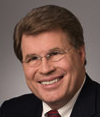ALEXANDRIA, VA – The National Community Pharmacists Association (NCPA) cheered the U.S. Supreme Court’s decision last week to hear an Arkansas case to decide whether ERISA preempts (supersedes) a state law that regulates pharmacy benefit managers (PBMs). NCPA officials describe PBMs as “massive corporate middlemen who have operated in a regulatory no-man’s land for decades.”
 “Pharmacy benefit managers have virtually no oversight, and as a result they behave like monopolies,” said B. Douglas Hoey, pharmacist, MBA, CEO of the NCPA. “Not only have PBMs failed to manage the cost of prescription drugs, which is why they were created, but they are inflating prices for patients and destroying local pharmacies.”
“Pharmacy benefit managers have virtually no oversight, and as a result they behave like monopolies,” said B. Douglas Hoey, pharmacist, MBA, CEO of the NCPA. “Not only have PBMs failed to manage the cost of prescription drugs, which is why they were created, but they are inflating prices for patients and destroying local pharmacies.”
NCPA has been fighting to rein in PBMs for years. NCPA pushes for state laws that would end PBM abuses such as spread pricing and gag clauses that cause patients’ insurance premiums and prescription out-of-pocket costs to soar. The latest battle comes from a case in Arkansas, where the state was blocked by a lower court ruling from enforcing Act 900, a law that “effectively prohibits PBMs from reimbursing pharmacies below the pharmacies’ cost to acquire the medication and includes provisions that would disclose to consumers and plans the hidden profit motives of PBMs.”
NCPA together with the Arkansas Pharmacists Association filed a brief supporting the state before the U.S. Court of Appeals for the Eighth Circuit, and will file a similar brief before the U.S. Supreme Court.
“This is an important moment for community pharmacies,” said Hoey. “There’s strong bipartisan agreement in the states that PBM behavior is out of control. The U.S. is the only country in the world that has turned over the management of prescription drugs to PBMs and the U.S. has the highest drug costs in the world. We don’t think that is coincidence.”
At issue is the extent to which the federal Employee Retirement Income Security Act of 1974 (ERISA), which regulates private employee benefit plans, preempts the states from regulating the amount that PBMs pay pharmacies to dispense prescription drugs that are covered by an employer-sponsored health plan. The PBMs, which are among the richest corporations in the world, say even though they are not liable as fiduciaries under ERISA, that statute shields them from state regulation when they are servicing an employer-sponsored plan.
 “Brown & Fortunato’s Health Care Group (“HCG”) represents a large number of pharmacies throughout the United States,” said Jeffrey S. Baird, JD, of B&F. “As chairman of the Health Care Group, I am acutely aware of the power wielded by PBMs. I support the Arkansas law regulating PBMs and I agree with the comments by Doug Hoey, CEO of NCPA. Currently, there is very little regulatory oversight of PBMs. They control the prices that consumers must pay…and the reimbursement paid to pharmacies. Drug prices are continuing to rise and, too often, reimbursement to pharmacies is below their cost. It is imperative that states have the authority to impose guidelines on PBMs.”
“Brown & Fortunato’s Health Care Group (“HCG”) represents a large number of pharmacies throughout the United States,” said Jeffrey S. Baird, JD, of B&F. “As chairman of the Health Care Group, I am acutely aware of the power wielded by PBMs. I support the Arkansas law regulating PBMs and I agree with the comments by Doug Hoey, CEO of NCPA. Currently, there is very little regulatory oversight of PBMs. They control the prices that consumers must pay…and the reimbursement paid to pharmacies. Drug prices are continuing to rise and, too often, reimbursement to pharmacies is below their cost. It is imperative that states have the authority to impose guidelines on PBMs.”
“ERISA doesn’t shelter the practices of PBMs,” added Hoey. “We’re very optimistic that the Supreme Court will agree that PBMs do not get to act with impunity from state and federal law.”
The court will likely hear oral arguments in early spring. It will render a decision before the end of June, which marks the end of the Court’s current term.

